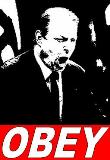SYDNEY (AP)-[off the wire, no link, similar stories here, and here]-An oil refinery, a busy railroad station, the stock exchange? Or was Sydney's iconic Harbor Bridge the target of a possible terror plot revealed this week by Australian Prime Minister John Howard?
Howard won't say, and neither will intelligence agencies tracking suspected extremist cells in the cities of Sydney and Melbourne. But newspapers have been full of speculation about likely targets of Australia's possible first terror atrocity.
The Australian newspaper detailed Friday how two people in Melbourne reported to intelligence agencies having seen men videotaping the stock exchange building in the southern city, and a railroad station.
A car spotted on both occasions was traced by police to the father-in-law of a man already under surveillance because of his links to an extreme Islamist group, The Australian reported, without naming either man.
Those incidents, which first were reported in June, led to a string of raids by intelligence agents and police in Melbourne and Sydney, but no arrests were made.
Speculation about a possible impending terror attack on Australian soil has been rife since Wednesday, when Howard held a nationally televised news conference to say he was rushing amendments to terror legislation through Parliament - recalling the Senate for a day to approve the changes - because of a perceived threat.
The tougher laws allow police to arrest people involved in the early stages of planning an unspecified terror attack.
"Police were engaged in operations that identified a potential terrorist attack but couldn't specify where and when," Attorney General Philip Ruddock told Nine Network television when asked to explain the urgency of the new measures. "They wouldn't have been able to do anything about it" without the changes, he added.
There were no reports Friday of arrests using the new powers.
Sydney's tabloid Daily Telegraph newspaper reported that Sydney Harbor Bridge and an oil refinery on the shores of the Pacific Ocean were likely targets, saying blowing either up would cause many casualties and widespread transport chaos.
But terrorism expert Aldo Borgu of the Australian Strategic Policy Institute said there was no such thing as a specific target.
"Anything's a target," he said Friday. "If you follow the past tactics of terrorists anywhere, basically (they target) large numbers of people in small enclosed spaces because that increases the number of casualties."
Howard said that intelligence agencies were closely tracking terror suspects.
"There have been people in our community for some time who would want to do harm, who were pleased about the terrorist attacks in Bali and in London and pleased about some of the terrorist attacks elsewhere in the world," Howard told Southern Cross Broadcasting's radio network.
As well as the changes pushed through this week, Howard's government has received backing from the opposition Labor Party for a package of tough new counter-terror laws that give authorities the power to lock up suspects for up to two weeks without telling them why or charging them, and place them under surveillance - including fitting them with electronic tagging devices - for up to a year. The new powers are expected to become law before year's end.
Civil libertarians have criticized those provisions.
"These are powers like those exercised in communist regimes and have no place in a democratic nation like Australia," Pauline Wright, vice president of the New South Wales Council for Civil Liberties, said in a statement.
Opponents say Howard's unwavering support for the U.S.-led strikes on Iraq and decision to send troops there and to Afghanistan have made it inevitable Australia will be attacked.
Last year, the country's embassy in Jakarta was badly damaged by a suicide bomber and dozens of Australians were killed in bombings in 2002 and last month on the Indonesian resort island of Bali.
"Saying it is inevitable is an easy thing, but inevitable is not imminent. Inevitable could mean five years' time, in 10 years' time. We simply don't know," Borgu said.
"We are at threat. Every country in the world is at threat from terrorism - some a hell of a lot more than us," he added. "We are basically still at the low end of the spectrum."
Copyright © 2005 Dow Jones & Company, Inc.(AP-DJ)--11-03-05 2333EST |











